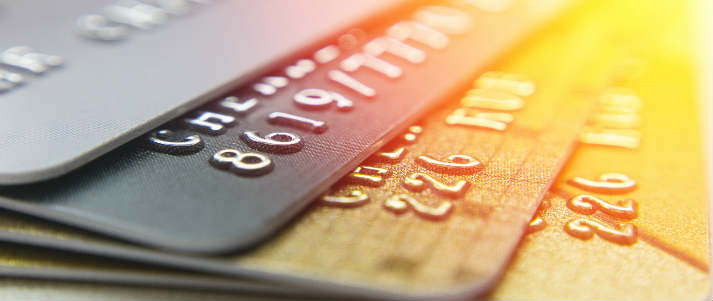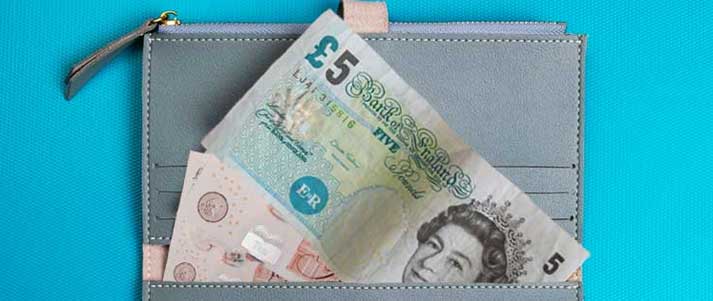Student overdrafts: everything you need to know
We won't deny it – one of the best student perks has got to be the free overdraft you're entitled to. But are you making the most of it?

Credit: StoryTime Studio (foreground), Ubermensch Matt (background) - Shutterstock
Anyone who has been to university will tell you that the student bank account overdraft is a big help when funds are running low.
In our annual National Student Money Survey, 37% of surveyed students said they used their student overdraft as a source of money. On top of that, 46% said they would use their overdraft when in need of emergency cash.
While there's no denying the perks of a 0% student overdraft, it's important you know exactly how it works, the potential pitfalls, and how you'll (eventually!) pay it back.
What's in this guide?
How does a student overdraft work?
An overdraft is when the bank lets you spend more money than you actually have, up to a pre-agreed amount.
When you go into your overdraft, it will show on your bank statement or online banking as a minus number. For example, if you have £100 and spend £200, your account balance will show as '–£100'. In this scenario, if you have a £1,000 arranged overdraft, your 'available balance' will then appear as £900.
Think of it as an emergency piggy bank that you can dip into if necessary, but that you'll need to pay back eventually as it's not technically yours. It's tempting to think of your student overdraft as free money but, unfortunately, this isn't the case – it's a loan.
There are two stages of overdraft you need to know about:
- Arranged overdraft – Sometimes called a 'planned', 'authorised' or 'agreed' overdraft, this is the amount pre-arranged with your bank that you're allowed to 'borrow' in your current account. With most student accounts, there won't be any interest or transaction charges on this overdraft amount (while you're still a student).
- Unarranged overdraft – Sometimes called an 'unplanned' or 'unauthorised' overdraft, this is when you exceed the pre-agreed amount you've arranged with your bank. The bank tends to charge you fees when this happens, so it's important to avoid doing this as much as you can.
Which banks have the best student overdraft?

Credit: Chermen Otaraev – Shutterstock
As you can probably imagine, choosing the right student overdraft involves choosing the right student bank account, as they come as a package.
Most high street banks will offer student accounts nowadays. You can find out what the best deals are for this year in our guide to the best student bank accounts.
You'll find overdrafts of up to £3,000 are available with many student accounts, but how much you actually get depends on your credit rating. Often the amount will start lower initially. In order to increase it, you'll have to ask about it at the end of each academic year (it doesn't happen automatically).
Student overdraft features
These are the main features associated with student overdrafts:
- Interest-free money – Finding an overdraft with 0% interest is crucial. You're probably going to spend a good few years in your overdraft, so the last thing you want is to be accumulating extra charges on what you spend. Not every bank will give you an interest-free student overdraft, so make sure you check this.
- A guaranteed minimum amount, usually increasing each year – Some high street banks offer an overdraft of 'up to' £3,000, but how much you actually get depends on your credit rating and what year of university you're in.
- Big enough for your needs, but not so big you won't be able to pay it back – Don't be blinded by the largest overdraft amounts. Although it's easy to get carried away when you see all those zeroes, remember you'll have to pay this back eventually. In reality, a bigger overdraft means more debt.
What to know before applying for an overdraft
Here are the key things to know about student overdrafts:
-
Overdrafts are not free money
An overdraft is essentially a loan, so you'll have to pay it back. Therefore, the less you borrow, the less you'll have to repay later.
While an overdraft is great to have as a backup, you don't have to use it just because it's there.
Thinking of your overdraft as free cash will likely result in you powering through it pretty quickly. But if you do this, where will you turn to for emergency cash?
-
The bank can cancel your overdraft at any time
Unfortunately, your overdraft is never 100% reliable. Most banks will have something in the T&Cs that permits them to cancel it at any time without reason.
It's unlikely that this would happen with a student account. However, it's still worth being aware of, as it could come with some hefty charges if you're none the wiser.
They'll need to inform you before they cancel, though. This is why you should always read every email or letter the bank sends you!
If your overdraft is cancelled, contact your bank immediately to agree on a repayment plan.
-
You get charged fees for going over your overdraft limit

Credit: Yevgen Kravchenko, kamui29, Bell Photography 423 – Shutterstock
If you exceed your overdraft limit, you'll have entered into an unauthorised overdraft. If this happens, you'll either face a penalty fee or your payment will bounce.
Unplanned overdraft fees vary from bank to bank. Usually, you'll have to pay a monthly fee plus a daily fee for every day you're over your limit. The charges can add up quickly!
The daily fee can be relative to how much you've overspent. If you're over by a hefty sum, you could be racking up massive fines.
Our guide to student bank accounts includes a breakdown of the unplanned overdraft fees charged by each bank.
-
Your credit rating could be affected by your overdraft
Your credit rating is important because it affects everything money-related, from your phone bill to buying a car or a property.
Although it does have a more noticeable impact later in life when you need to apply for things like a mortgage, having a good credit rating relies on you being sensible with your student account. Plus, you'll even need a decent credit score to get a student overdraft in the first place.
If you're constantly going over your arranged overdraft limit, have had your overdraft cancelled or have been turned down for extensions on your limit, this is an indication that your credit score is in bad shape.
Try to have some foresight about the impact your spending habits could have on your future finances. We've got a guide on how to improve your credit rating if you're worried about it.
-
You can usually only have one student account
You might've heard other students saying that once you've hit your overdraft limit, you can just open another student account and start over with another overdraft.
However, most (if not all) banks will have a clause in their terms and conditions that forbids you from opening more than one student account.
Plus, having multiple overdrafts is a sure-fire way to cause your debt to spiral out of control. If you can't pay back the first overdraft, are you really going to be able to repay a second one?
Opening multiple accounts also has the potential to do terrible things to your credit rating, so think very hard before you decide to borrow even more money.
Overdraft charges
Dipping into your unarranged overdraft can have a wide range of repercussions (including monthly fees, daily fees and transaction fees) and banks often make it difficult to understand exactly how much you'll be charged.
You would likely get charged around £13 as a monthly fee for going over an arranged overdraft limit of £500 for 30 days. This is a big improvement on previous charges as, prior to April 2020 when fees were slashed, you could have been charged up to £30 for the same unarranged overdraft usage.
Wondering how to avoid overdraft fees? These tips will help you stay within your arranged overdraft limit:
-
Keep track of regular incomings and outgoings
Be mindful of your regular payments like Direct Debits and standing orders. It's best to note down how many you have, for what amounts and the days they come out of your account. Pay extra attention to payments such as phone bills, which can be unexpectedly higher month-on-month.
This way, you can make sure you're always far enough from your overdraft limit that you won't go into your unarranged overdraft when your bill comes out. This is the most common situation that results in a charge for exceeding overdraft limits and incurring charges.
Not having enough cash to cover these payments can go two ways. If the bank makes the payment on your behalf (meaning you go over your overdraft limit) you're likely to be charged a fee. Or, if the bank stops the payment from going through, you could end up paying an admin charge to the company you failed to pay, plus a returned item fee to your bank.
The most effective way to keep an eye on your account and avoid charges is to have a detailed student budget. Our step-by-step guide will help you set yours up. -
Use a prepaid card for spending money

There are loads of smart new prepaid cards and banking apps that are aimed at helping you budget more effectively.
These cards are linked up to your phone so you get a notification every time you spend cash. Plus, you'll be alerted when you're about to go over budget.
After you've worked out your weekly budget, you can transfer your allocated spending money each week onto a prepaid card. This means that you'll only ever spend what you've permitted yourself to.
This way, you'll have much better control of what goes in and out of your account on a daily basis to help you avoid spending past your overdraft limit.
-
Use mobile banking
Hooking up your bank account to your phone to get updates about your balance might sound like hell.
However, research has shown that it can encourage you to have much better control of your finances if you have access to an overview of where all your money is going.
In fact, the FCA has previously found that you're around 24% less likely to incur overdraft charges if you use mobile banking with text alerts.
Paying off your student overdraft
After graduating, you'll be eligible for a graduate bank account.
Graduate bank accounts are designed as a stepping stone to give you some time to pay off your overdraft without interest before entering the big bad world of regular fee-charging overdrafts. Alas, all good things must come to an end.
How graduate bank accounts work
Graduate bank accounts still come with a 0% overdraft. You'll usually be eligible to hold onto this account for three years following graduation.
But, whereas you saw your overdraft limit increasing each year with your student overdraft, the limit gets reduced with a graduate account. This way, the bank hopes you'll gradually pay it off year by year.
For example, a bank might give you a 0% overdraft of £3,000, which will then go down to £2,000 in year two, then £1,000 in year three.
While some student bank accounts will automatically transfer you to a graduate account when you finish your degree, never assume this will happen. If it doesn't, you could start getting charged interest on your overdraft.
As always, do your research into the options available just in case there's a better deal elsewhere. We've got full details on the best graduate accounts to help you with that, as well as a guide on how to switch bank accounts if you find a better deal.
Looking for more info on each bank as well as how much overdraft they're offering this year? Check out our YouTube video all about the latest student accounts.
Keen to get out of your overdraft sooner rather than later? Our list of ways to make money quickly has everything you need to know.








